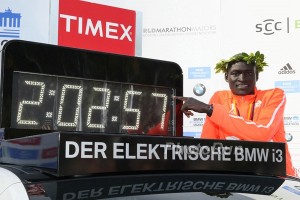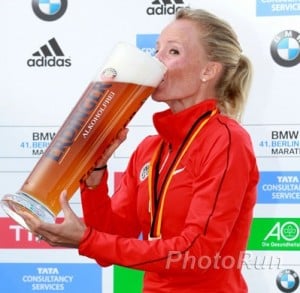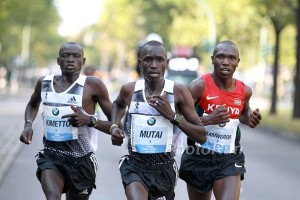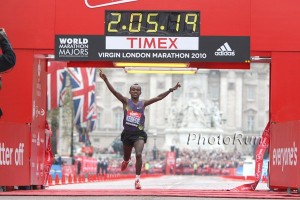WTW: All Hail Larry Rawson And Dennis Kimetto, Sub-2 Here We Come, Shalane And Emmanuel Win By Losing, Rupp’s Medal Chances Go Up, Runners Are Crazy And Deena Says Paula’s WR Was Bad For The Sport
The Week That Was In Running – September 22 – September 28, 2014
by LetsRun.com
September 30, 2014
Previous versions of the Week That Was can be found here.
Questions? Comments? Email us.
****
2014 BMW Berlin Delivers
Well the 2014 BMW Berlin Marathon certainly lived up to the hype. Record attempts more often than not leave fans disappointed but Berlin got it right this year as they had a real race in addition to a record attempts on both the men’s and women’ side.
How does one put history’s first ever sub-2:03 marathon into perspective?
 Well we can think of no better way than to start with our Message Board Post of the Week. A poster posting under the name “Larry Rawson” – perhaps “fake Larry Rawson” would have been better – started a thread and it sums up Kimetto’s world record perfectly:
Well we can think of no better way than to start with our Message Board Post of the Week. A poster posting under the name “Larry Rawson” – perhaps “fake Larry Rawson” would have been better – started a thread and it sums up Kimetto’s world record perfectly:
“Go to your local high school track and run a lap in 69.9 seconds.”
The world record in the marathon is now so fast that if run on a standard 400 meter track, it would be under 70 seconds per lap – 69.93 seconds per lap to be exact.
Given all the times track fans have nearly pulled their hair out having been told to go to the local HS track by the television announcer Larry Rawson on seemingly every single broadcast he’s done on American TV, we could only chuckle as this time we think it’s actually for once useful for hard core track and field fans.
****
Sub-2, Here We Come??? Nope.
Kimetto had barely crossed the line with history’s first sub-2:03 marathon when people started to ask if this meant we were well on our way to sub-2:00 in the marathon.
The answer is still NO. If you want a detailed explanation as to why, read LetsRun.com co-founder Robert Johnson‘s piece on this topic from last year: The Myth Of The Sub-2-Hour Marathon.
Here’s a CliffsNotes version: 3 minutes is a LOT of time in the marathon.
We are still 6.75 seconds per mile away from it. That’s a lot. That’s 1.5 seconds per lap on track and repeat that for 26.2 miles.
Yes, the marathon world record has come down a lot in recent years (3:08 in the last 16 years, 3:58 in the last 26 years) but it’s now just lining up with the 5,000/10,000 records on the equivalency charts and the 5,000/10,000 records haven’t moved at all in years.
For the first time in recent history, the marathon world record is now better than the 5,000 and 10,000 equivalent charts that we go by – those produced by LetsRun.com stat/coaching guru John Kellogg.
With the old value of 2:03:23, the distance world records were almost perfectly lined up as John Kellogg had that equivalent to a 12:36.8 5,000 (world record is 12:37.35) and 10,000 of 26:17.4 (world record 26:17.53).
Now the marathon world record is better than the 5,000 and 10,000 WRs – which makes sense as there is way more money in the marathon than at 5,000 and 10,000.
2:02:57 Is Equivalent To:
12:34.13 – 5,000
26:11.12 – 10,000
The sub-2 equivalent is a long way off. Again we’re talking 6.75 seconds per mile for the marathon. So unless you think a human is capable of running something like 12:15 or 25:35 for 10,000, we aren’t seeing sub-2 in a LONG TIME.*
*Disclaimer: Assuming WADA continues to get funding and anti-doping remains stringent and races are run on standard road surfaces.
LetsRun visitor Dr. Michael Joyner disagrees and thinks it could happen fairly soon.
More: MB: NOW do you not think a sub-2:00:00 marathon will happen?
*LRC Archive: The Myth Of The Sub-2-Hour Marathon.
****
 Shalane Flanagan Moves To #2 All-Time In American History
Shalane Flanagan Moves To #2 All-Time In American History
American Shalane Flanagan passed up a much bigger payday in Chicago and went for the American record in Berlin. She didn’t get the record but she did get our respect.
Flanagan summed up her weekend perfectly when she said to Cathal Dennehy after the race:
“We went big. I don’t race conservatively. We’d come to test our limits and we found out today where it was.”
The limit for Flanagan and really the entire Berlin women’s field proved to be 40k.
Flanagan was still on 2:20:34 pace at 40k, but it took her 7:59 to get home, which means she averaged 5:51.2 mile pace for the final 2.2 km (1.36 miles), significantly slower than the 5:23.35 she averaged for the whole race.
It’s worth pointing out that the two women in Berlin ahead of Flanagan also faded. For example, race winner Tirfi Tsegaye of Ethiopia, who went through halfway in 69:58, was still on 2:20:05 pace at 40k, but ended up running 2:20:18, as it took her 7:30 to get home. Her final 2.2km was run at 5:29.9 pace.
Kimetto on the men’s side was pretty good from 40k to the finish. At 40k he was on 2:02:53 pace. It took him 6:28 to get home (if he hadn’t faded at all it would have taken him 6:23.5), so he managed 4:44.5 mile pace for the final 2.2k versus 4:41.2 mile pace for the first 40km.
Coach Renato Canova has a great post-race blog about the transformation of the men’s marathon since 2008 on Alberto Stretti’s website (our only complaint about the piece is he talks about Haile G’s sub-2:04 as being a transformative moment – we think it was Wanjiru’s Olympic gold that year) which includes all of the major splits for the leading men. World Half-Marathon champ Geoffrey Kamworor had the biggest blow up of everyone. His final 2.2 km was slower than Flanagan’s (8:06). He was on 2:05:04 pace at 40k but staggered home in 2:06:39 as he was barely under 6-minute pace for the final 2.2 km (5:56.3 mile pace).
****
Emmanuel Mutai Also Impresses Us By Losing – At Least He Gets A Consolation Prize
There was one important thing we didn’t mention in our initial recap and analyis of Dennis Kimetto’s 2:02:57 world record. Runner-up Emmanuel Mutai did get to take home one thing besides the heartbreak of yet another second place finish at a major. Mutai, who has finished second 7 times at a major, but first only once, does leave Berlin as the new 30k world record holder.
Mutai had a slight lead at 30 kilometers and thus set the IAAF 30K world record of 1:27:37, breaking the 1:27:38 mark that Patrick Makau had run in Berlin in 2011 en route to his 2:03:38.
Please pause and think about Mutai’s race for a minute.
Here’s what he did. He ran the first 30k in a world record 1:27:37. That’s an average of 14:36.1 per 5k for the first 30k.
He then picked it up and ran 14:11 for his next 5k AFTER running a world record for 30k. Guess where he stood in the race at 35k? He’d been dropped by Kimetto who ran 14:09 from 30k to 35k.
Truly ridiculous.
Mutai certainly leaves Berlin with something besides the runner-up showing and 30k WR. Our utmost respect.
The way he handled breaking the old world record but losing the race was with TOTAL class. We’re so used to athletes in the American team sports tell us how they made a mistake and should have, could have won that it was refreshing to read this quote from Mutai after the race according to the Associated Press, “I feel good for the achievement I achieved today. It wasn’t easy. The race was a bit tough, but you know, I was fighting, and the better man won,” said Mutai after the race.
5k Splits for Kimetto and Mutai
Kimetto Mutai
5 km 14:42 14:42
10 km 29:24 (14:42) 29:24 (14:42)
15 km 44:10 (14:46) 44:09 (14:45)
20 km 58:36 (14:26) 58:35 (14:26)
25 km 1:13:08 (14:32) 1:13:08 (14:33)
30 km 1:27:38 (14:30) 1:27:37 WR (14:29)
35 km 1:41:47 (14:09) 1:41:48 (14:11)
40 km 1:56:29 (14:42) 1:56:36 (14:48)
Finish 2:02:57 2:03:13
Halves 1:01:45 / 1:01:12 1:01:46 / 1:01:27
*****
Thank You Berlin, Galen Rupp Medals Again
Galen Rupp didn’t actually medal last week, but the results of the BMW Berlin Marathon certainly showed that he has a real good shot at winning his second global medal in 2015.
What the hell are we talking about?
Well let us start by saying the Mr. Rupp is very, very good. The world leader at 10,000m in 26:44.36 and winner of the Pre Classic 10,000 doesn’t need a whole lot of help to medal. Credentials like that are certainly going to put you in the hunt.
But it never hurts to have a little extra help does it?
The finances of the sport are certainly helping Rupp.
Last year, in Moscow, Rupp was fourth in the 10,000. The 5th-placer was Ethiopian Abera Kuma. Kuma is four years younger than Rupp, having recently turned 24. He has PRs of 13:00.15 and 26:52.85. He also was 5th in the 2011 world champs. Next year in Beijing, he’ll be in his prime but he very well may not be competition for Rupp. Kuma has moved up to the marathon. Kuma was third in Berlin in 2:05:56 on Sunday after making his debut earlier this year in Dubai (2:09:53). As a 2:05 marathoner, we highly doubt he’s headed back to the track. If he can consistently run 2:05 and finish top three at a major, he’s bound to pull in a six-figure income (officially Kuma won 15,000 Euros for third which is $19,038 but that ignores appearance fees/endorsements).
The fourth placer in Berlin was even younger. Kenya’s Geoffrey Kamworor is still just 21. At age 18 in 2011, in the span of 8 days, he ran his track prs of 27:12 at Pre and then 13:12.23 in New York. In years past, this former world junior xc champ, who will be 22 when Worlds roll around next year, would almost certainly have been leading Kenya’s charge on the track in the men’s 10,000. Instead he’ll be likely preparing for the seventh marathon of his career. Yes, seventh at age 22.
Unless you are the very best on the track it’s much more lucrative for an African runner to be on the roads in the marathon than on the track.
****
Vices Are Bad, Running Fast Is Good (Tsegaye Kebede Struggles)
Last week, Ethiopian Tsegaye Kebede, the only man from the top 15 at the 2008 Olympics that is still a major force in the marathon, had a rare bad race – well at least by his standards – in the marathon.
Don’t worry. We are still huge fans of him. As we said on the messageboard before the race, Kebede’s consistency in the marathon is truly amazing.
The 27-year-old Kebede ran 2:10:27, the second-worst of his 18 career marathons. Kebede, by our count, is the world record holder for most career sub-2:07 marathons (10), most sub-2:08 marathons (12), most sub-2:09 marathons (14), most sub-2:10 marathons (15) and most sub-2:11 marathons (18). Yes that’s right. We think he’s 18 for 18 at breaking 2:11 (if you know of a DNF, let us know).
Most Sub-2:03s
Dennis Kimetto – 1
Most Sub-2:04s
Wilson Kipsang – 3
Most Sub-2:05s
Wilson Kipsang- 5
Most Sub-2:06s
Haile Gebrselassie – 5
Wilson Kipsang – 5
Geoffrey Mutai -5
Most Sub-2:07s
Tsegaye Kebede – 10
Most Sub-2:08s
Tsegaye Kebede – 12
Most Sub-2:09s
Tsegaye Kebede – 14
Most Sub-2:10s
Tsegaye Kebede – 15
Most Sub-2:11s
Tsegaye Kebede -18
(Please let us know if you see a mistake in the list above).
The key to Kebede’s consistency? Well the diminutive Ethiopian had a great pre-race Q&A with LetsRun.com friend Sabrina Yohannes in which he said it’s desire, health and total focus.
On his humble start, Kebede said:
“Where I come from, my family was poor; we had very little, less than anybody. But praise God, when you put in the effort, and you have hope, and you work, there’s nowhere you can’t go. And you have to keep remembering, ‘Where have I come from? How far do I need to go?’ and that motivates you. Where you come from can be decisive.”
but we loved his quote about total focus and having no vices even more:
“You know, what allows you to achieve these kinds of goals is being healthy. More than anything, an athlete must be healthy and injury-free. The environment where you spend your time is also critical. I spend my time with my sisters and brothers, several of whom live with me. I get home from somewhere, I eat, I rest, then I train. There are no distractions. I have no vices. I’m healthy, I maintain my fitness and work with capable athletes and a capable coach [Getanuh Tessema]. He gives me advice, I take his advice.”
More: Read the Whole Running Times Q&A with Kebede Here The Q&A includes a great anecdote about how Kebede didn’t understand how chip timing worked in his first race and he lost out on a spot as a result and was so mad, he went to sleep without eating that night.
****
Stat of the Week I : Tsegaye Kebede Is More Than 2 Times Greater Than The Entire US of A.
Maybe the stats above regarding Kebede didn’t properly blow you away. Well, how about we present them in another fashion for you?
# of Sub-2:07 marathons produced in American history – 4
# of Sub-2:07 marathons produced by Tsegaye Kebede – 10
# of Sub-2:08 marathons produced in American history – 6
# of Sub-2:08 marathons produced by Tsegaye Kebede – 12
****
Stat of The Week II
10 – the number of Americans that have ever run a half-marathon faster than 61:28.5 pace that Kimetto averaged in Berlin.
Ryan Hall (59:43)
Dathan Ritzenhein (60:00)
Todd Williams (60:11)
Abdi Abdirahman (60:29)
Galen Rupp (60:30)
Mo Trafeh (60:39)
Mark Curp (60:55)
Meb Keflezighi (61:00)
Khalid Khannouchi (61:17)
Shadrack Biwott (61:25)
####
Random stat worth a sentence: 36-year-old Falk Cierpinski, the son of two-time Olympic marathon champ (and likely doper) Waldemar Cierpinski, was 17th in Berlin in 2:17:25. His pb is 2:13:30.
*****
Alexa Efraimson Is Ineligble for NXN
Last week, US high schooler Alexa Efraimson, who recently gave up her collegiate eligibility and went pro and signed with Nike, ran her first race as a pro as she competed the at Stanford XC Invite. Anyway, seeing that she was running a fall xc campaign, we wondered if she might try to defend her Nike Cross Nationals crown later this fall.
No she will not.
Check this out. We find it totally bizarre that one of the rules for the Nike Cross Nationals is that you have to be in “good standing with the NCAA.” That makes no sense to us. For years, Nike has battled high school bureaucracies to get teams to its NXN meet (the teams run as clubs instead of their official high school names, e.g. Manlius XC Club instead of Fayetteville-Manlius HS, as many states don’t allow out of state competition). It also for years has offered big money for top collegians and high schoolers to go pro and skip out of collegiate competition (and now high school). Yet one of the criteria for eligibility for its own meet is you have to be an amateur? Really?
If NXN is a meet for the top American high schoolers, why does it matter if they are pro or not? It shouldn’t.
Amending the rule would be a smart move by Nike. It would give one of their upcoming stars a goal to shoot for this fall and Efraimson’s home of Camas, Washington, is just 20 miles from Portland. It would make sense for Nike to promote one of its pros who lives so close to the race.
****
Video of the Week/Runners Are Officially Crazy
Have you ever taken a step back and looked at runners, maybe during a time when you were injured, and thought, “My gosh their dedication to running as fast as possible in a circle is kind of crazy.”
Well, we have. It’s amazing how once humans get a goal, everything else falls by the wayside.
If you haven’t thought before that runners are crazy, this video should prove it to you. Check out what marathoners did when a train got in their way at the Mill Race Marathon in Columbus this weekend.
We can understand going between the cars but underneath them?? No thanks.
We got an email from a race official who said the following:
More: Train presents obstacle during Columbus marathon
Finishers: 26,450 men + 7,898 women = 34,348 total (up from 32,997 last year)
****
6 Quotes of the Week (that weren’t quote of the day)
I – Deena Kastor says Paula’s WR was bad for the sport
“In a way, Paula’s record hurt women’s running because it was so out of reach that women don’t even try to break it—instead they race each other for the win. But these women today can see that it is within reach.”
– Deena Kastor talking to Runner’s World.
More: 10 Things We Learned From Deena Kastor Over Lunch at Our Place
###
II – Personal Domestic Issues Hampered Asbel Kiprop This Year
“As much as I trained hard I just couldn’t concentrate on my races owing to these problems. I just couldn’t take them off my head.”
– 1500 meter star Asbel Kiprop talking to the Kenyan press about his disappointing 2014 campaign (by his lofty standards).
###
III – A Runner Shouldn’t Always Wonder “What If” If They Don’t Go For It In The Sport
“I think you owe it to yourself to see what else you can do. I don’t think what you did in college is your full potential. I think you might regret it if you don’t at least give it one more shot and see what you can do in a new program completely different than Colorado.’”
– advice that Matt Tebo gave to Laura Thweatt when they both graduated from the University of Colorado. Thweatt, who had a 15:57 pb in college, almost didn’t have a post-collegiate career. She is now a 2016 Olympic hopeful with a 15:04 5000 pb. The quote comes from Mitch Kastoff’s feature on Thweatt for the Daily Relay.
More: Boulder Track Club’s Laura Thweatt “Is The Best Runner You Only Sort Of Know”
###
IV – The IOC Needs To Kiss Butt With Politicians
“In the past, people have said sport is nothing to do with politics, or with money and business.”
“This attitude is wrong and we cannot afford it anymore.”
“We have to partner up with the politicians who are running this world, and with international Governments.”
“To ensure the functioning of worldwide sport, we must be politically neutral but realise that our decisions have political implications.”
– IOC President Thomas Bach talking to Inside the Games.
###
V – Usain Bolt Distinguishes Between Intentional and Unintentional Doping Just Like LetsRun.com
“There were mistakes but there weren’t any serious drugs.…It is still bad: the drug scandal. But it was a good thing it wasn’t like they were deliberately going out of their way to take drugs.”
– Usain Bolt talking about the big Jamaican doping positives of late.
More: Bolt On Jamaican Drug Positives:
###
VI – Emma Bates Doesn’t Want To Finish 2nd
“If there is somebody in front of me this year, I don’t think I’ll be the type of person to settle for second. I’m not that type of person anymore. I’m not a bridesmaid, I’m going to be a bride again. I’m not going to lose again.”
– Emma Bates talking to Mitch Kastoff about the upcoming 2014 NCAA champs. Bates’ first major race of her 2014 campaign was a 6th-place showing at Roy Griak.
More: “Emma Bates’s Forest Fire”
****
Shame on Great Britain
Last week, UK Atheltics issued a press release on the upcoming cross country season. They had the gall to start the release with:
Cross country has always been the bedrock of the British endurance running community and competition programme. The 2014/2015 season is no different, encompassing three key international competitions spread throughout the winter period.
and then go on to say they will only send seniors to World XC whom they think are capable of top 30 at Worlds.
The IAAF needs to play hardball. Tell the Brits that given their resources, they aren’t welcome to compete in any event at Worlds (they are sending full junior teams) unless they also field senior teams.
Has the British Empire fallen so far that they can’t come up with, what, – $20-40,000 – to send a team of 12 (6 men, 6 women) to the Worlds once every two years?
The IAAF ought to tell them they won’t be allowed to enter anyone at 2017 Worlds unless they are capable of top 5 and see how that goes over.
More: *MessageBoard (MB): Pathetic: Great Britain’s new motto – “If you can’t win, then don’t try at all.” What a horrible message to send!
*Athletics Weekly Writer Angered UKA Will Only Take Men Who Can Make Top 30 At World XC Champs “Do we avoid the Africans like cowards and deprive British athletes of experience on the world stage?”
****
Shame on South Africa
We have scorn for more than just the bureaucrats in the UK. Moving on to South Africa, officials at the Comrades Marathon have stripped former teen phenom Zola Budd of her Comrades Masters title from earlier this year because she didn’t wear a special bib to indicate she was a master, even though race officials told her she didn’t need to wear the bib (wouldn’t nearly everyone recognize Budd?).
Budd has initiated legal proceedings as a matter of principle, not for money, as the prize money is only $1,000. Much of Budd’s career in South Africa was filled with heartache as there were apartheid-related boycotts and she was forced to compete for Great Britain. Thus her return to her birthplace for Comrades was a special moment for her, particularly since the stadium roared. Ray de Vries, manager of the Hooters Athletics Club, summed up the situation perfectly to the AP:
“It was a homecoming for Zola. The whole stadium got up. They went mad. It was just a beautiful, beautiful time after the horribleness of her career. And then it was marred by this silly incident.”
Budd, 48, was quoted by local media as saying: “I won it fair and square. My whole athletics career has been plagued by politics and interference from administrators who are selective and do not apply the rules consistently. It feels like they are targeting me specifically.”
****
Stat Of The Week III
8 – number of running events at 2014 Asian Games won by athletes not born in Asia (so far).
2 – number of running events at 2014 Asian Games won by athletes born in Asia (so far).
The running events won by people not born in Asia are: Men’s 100 (Femi Ogunode), Men’s 1500 (Mohamed Al-Garni), Men’s 5000 (Mohamed Al-Garni), Men’s Steeple (Ali Abubaker Kamal), Women’s 400 (Kemi Adekoya), Women’s 1500 (Maryam Jamal), Women’s 10,000 (Alia Mohamed Saeed), Women’s Stepele (Ruth Chebet).
The running events won by people born in Asia are: Men’s 400 (Youssef Al-Masrahi), Women’s 100 (Wei Yongli).
###
Drug Cheat Rashid Ramzi Medals
It’s worth noting that the winner of the silver medal in the men’s 1500 at the Asian Games was the disgraced Rashid Ramzi, the man who had his 2008 Olympic 1500 gold medal taken from him.
Track and field fans, don’t worry. An Asian Games silver medal in the 1500 isn’t that hard to win. Ramzi’s 1500 pb since returning from his drug ban is just 3:40.95. Running without drugs is A LOT harder than with drugs.
****
Stat of The Week IV/Most Ridiculous Prize Money Awarded
Every week we scour or copy of Race Results Weekly, looking for a really ridiculous performance that still earned significant prize money.
We thought we found a winner at the Quad Cities Marathon where two people earned money in the women’s race for running over 3:05.
3. Laurie Cass, USA 3:07:46 1000
4. Nikki Cahen, USA 3:08:58 750
But then we found the Oasis Rock ‘n’ Roll Montreal Marathon and Half-Marathon in Canada. There the winner won $3,584 (4,000 Canadian) for running over 3:00.
WOMEN –
1. Joanne Normand 3:01:27 CAD 2000 + 2000c
2. Marie-Caroline Cote (40+) 3:03:05 1000 + 500c
The 9th-placer in Berlin, Rene Kalmer, earned basically the same amount ($3,807 /3,000 Euros) for running 32 minutes faster (2:29:27).
****
Recommended Reads
LRC Wannabe Distance God Book Review And Blue Collar Runner Of The Month #2
The beauty of LetsRun: Renato Canova Talks About Wilson Kipsang’s Training Schedule
Boulder Track Club’s Laura Thweatt “Is The Best Runner You Only Sort Of Know”
“10 Things We Learned From Deena Kastor Over Lunch”
****
Quotes Of The Day & Last Week’s Homepages:
Note: To see a particular day’s homepage, click on the hyperlink of the date. The hyperlink below the date on the quotes will take you to that particular article – not that day’s homepage.
– Dennis Kimetto speaking after setting the world record with 2:02:57 at the 2014 Berlin Marathon. No need anymore for the disclaimer, “The fastest time on a record-eligible course.”
– No need anymore for the disclaimer “The fastest time on a record-eligible course.”
– Providence alum / 67:11 half marathoner Kim Smith talking about her relationship with legendary distance coach Arthur Lydiard when she was growing up in New Zealand.
– Shalane Flanagan talking ahead of her American record attempt at Sunday’s 2014 Berlin Marathon. Deena Kastor‘s current AR stands at 2:19:36.
– Timothy Tays, our September Blue Collar Runner of the Month, writing in his book Wannabe Distance God on how many of us want the guy who tries the hardest to win, when often that isn’t the case.
– Identical twins Jim and Joe Rosa talking about the 2014 NCAA cross-country season with Running Times. Will the Cardinal underachieve again or break through for the program’s first NCAA title since 2003?
– Excerpt from Daily Relay article by Mitch Kastoff about the rise of Boulder Track Club’s Laura Thweatt. Thweatt went from not getting recruited by Oregon, to not making NCAAs (while running for Colorado) to running 15:04 this past spring and becoming one of the top 5K women in the US.
Questions? Comments? Email us.




